Seattle Children’s Research Institute's B. Wayne Hughes Building, also known as Building Cure, includes a next-generation science classroom, where students can do innovative curriculum in a state-of-the-art laboratory embedded in the research institute.
Teachers and administrators from all schools can apply for a half-day field trip with priority given to underserved schools. Field trips include a laboratory activity in the Science Discovery Lab and a career talk from a scientist, when possible.
- Field trips are offered in the morning on weekdays and are approximately three hours in duration. Availability is limited.
- Students must be in grades 9-12. Grade 8 students may be accommodated upon request; the curriculum for grade 8 students includes four additional lessons taught by the classroom teacher to support the field trip to the Science Discovery Lab.
- A minimum of 18 students participating is required in order to reserve a date. The maximum capacity is 32 students.
- Funding for transportation may be available upon request.
- Teachers can select from several laboratory activities linked to immunotherapy, infectious diseases, gene editing, and more.
- Signed permission slips are required for all students.
- Attendees must be dressed appropriately to work in a laboratory, including ankle-length clothing and closed-toe shoes.
- Attendees must adhere to current Seattle Children's guidelines, which may include wearing masks while on campus. Isolation masks will be provided if needed.
How to Apply
Applications for the Science Discovery Lab are now available for the 2025-2026 school year.
Curriculum
The curriculum meets the Next Generation Science Standards as well as state and national academic standards, and also incorporates current research methodologies and techniques with instruction from leading scientists and educators. Curriculum modules include:
Grades 9-12
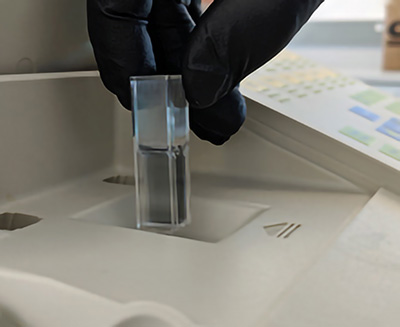
Determining Protein Concentration With a Bradford Assay
This module is appropriate for students in grades 9-12. Students will:
- Learn about a laboratory technique called a Bradford Assay and how it is used to measure protein concentration.
- Use a spectrophotometer and plot points on a graph to develop a standard curve.
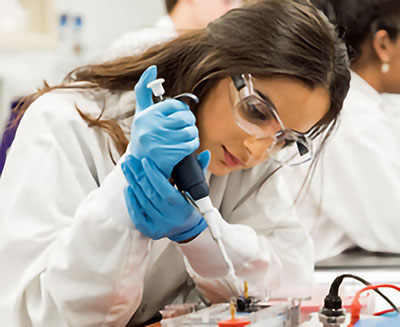
Investigations in Infectious Disease
This module is appropriate for students in grades 9-12. Students will:
- Learn about the fields of epidemiology and infectious diseases.
- Use standard epidemiological techniques to investigate an outbreak of foodborne illness.
- Use gel electrophoresis to perform a DNA fingerprinting experiment.
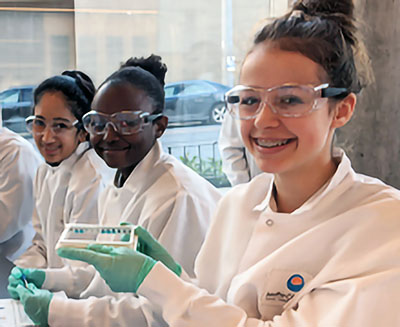
Using ELISA to Evaluate Immune Responses
This module is appropriate for students in grades 9-12. Students will:
- Learn about Enzyme Linked Immunosorbent Assay (ELISA).
- Use ELISA to detect the presence of antibodies in simulated patient samples using a color-changing reagent.
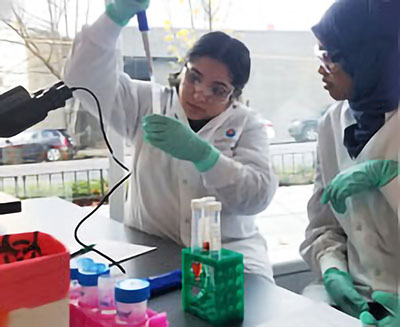
Isolating White Blood Cells With Ficoll
This module is appropriate for students in grades 11-12. Students will:
- Learn about CAR T-cell immunotherapy and emerging cancer therapies.
- Use Ficoll separation to isolate white blood cells.
- Use a microscope to determine white blood cell concentration.

Using Gene Editing to Express Proteins in Bacteria
This module is appropriate for students in grades 11-12. Students will:
- Learn how gene editing is used to express proteins in bacteria to create insulin therapies for patients with type I diabetes.
- Use gel electrophoresis to visualize engineered gene products.

Using Quantitative PCR to Test for COVID-19
This module is appropriate for students in grades 11-12. Students will:
- Learn about Quantitative Polymerase Chain Reaction (qPCR) and its applications in biomedical research and healthcare.
- Perform qPCR and explore its use in detection of SARS-CoV-2 in simulated patient samples using fluorescence.
Grade 8
The module for students in Grade 8 is a multi-day unit that requires four lessons taught by the classroom teacher to support the field trip.
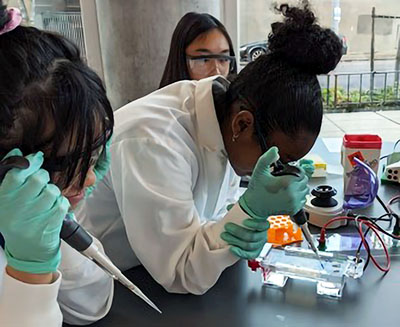
Investigations in Infectious Disease: Outbreak on the Hospital Ship USNS Relief
This 5-day curriculum unit is appropriate for students in grade 8 and is a partnership between the classroom teacher and Seattle Children's. There are four classroom lessons and one 2.5 hour field trip to the Science Discovery Lab in downtown Seattle.
- In the classroom, students will learn about the fields of epidemiology and infectious diseases, the steps of an epidemiological investigation, and how scientists can use DNA to identify the source of an infection. All materials for the classroom lessons will be provided.
- During the field trip, students will use gel electrophoresis to generate DNA fingerprints to identify the source of an infectious disease outbreak.
Contact Us
For more information, please email the Science Education Department.
 Seattle Children’s thanks Microsoft for supporting activities in the Science Discovery Lab.
Seattle Children’s thanks Microsoft for supporting activities in the Science Discovery Lab.
